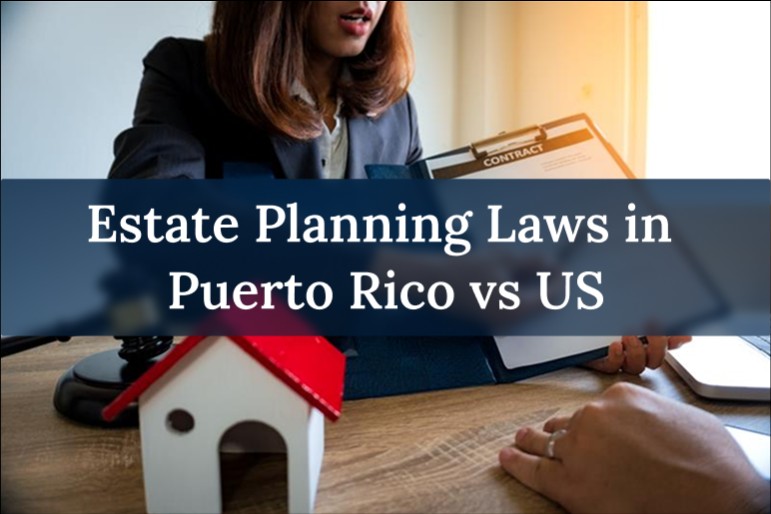
If you live in Puerto Rico, estate planning isn’t just about who gets what—it’s also about how the law distributes your assets. Many residents are surprised to learn that estate laws in Puerto Rico operate under a completely different legal system than the U.S. mainland. While Americans living in the 50 states rely on common law, Puerto Rico uses civil law rooted in Spanish legal tradition. That difference affects everything from wills to inheritance rights.
“According to the American College of Trust and Estate Counsel, more than 60% of Americans die without a will, and among expats or dual residents, that figure is even higher.”
This blog explores why Puerto Rican residents need a customized estate plan and what they should do to protect their families and wealth.
Table of Contents
ToggleHow Does Puerto Rico Law Differ from the U.S. Law?
Puerto Rico’s legal system is based on civil law, which emphasizes codified statutes rather than case law. One major difference lies in forced heirship rules, which dictate that certain heirs (like children and spouses) are legally entitled to a portion of your estate.
In contrast, many U.S. states give individuals more flexibility to decide how their assets are distributed in their estate plans. This means:
- You can’t disinherit children in Puerto Rico as easily as you could in the mainland.
- Unless a legal plan is in place, assets in Puerto Rico are divided based on a fixed statutory formula.
- The surviving spouse may be granted “usufruct,” the right to use certain assets.
These laws make estate planning in Puerto Rico much more structured, but also more complex.
Essential Documents in a Puerto Rico Estate Plan
While some documents are similar to those used in the U.S., others have unique requirements under Puerto Rican law:
- Will (Testamento): Must be notarized and comply with local formalities. Holographic (handwritten) wills are allowed but must meet specific standards.
- Powers of Attorney: Often more limited in scope unless specifically expanded.
- Living Will / Advanced Health Directive: Must be executed with proper notarization.
- Trusts: Less common but gaining popularity among high-net-worth individuals to manage assets and avoid forced heirship.
It’s essential to work with an attorney familiar with Puerto Rican law to make sure your estate documents are properly prepared and legally valid.
Do U.S. Wills Work in Puerto Rico?
Technically, a valid U.S. will might be recognized in Puerto Rico, but execution can be difficult. Courts may question whether the document meets Puerto Rican standards, especially if:
- It lacks a notarial component
- It attempts to override forced heirship
- It is written in English without a certified translation
If your assets or beneficiaries are in Puerto Rico, it’s far safer to draft a localized estate plan.
How Do Inheritance Laws Impact Family Members?
Puerto Rico follows a strict hierarchy of inheritance:
- Children (including adopted): Receive two-thirds of the estate.
- Spouse: May be granted the right to use the marital home (usufruct) or receive a share of the estate.
- Parents: Can only inherit if there are no surviving children or a spouse.
These rules apply even if you have a will. That means if you don’t plan properly, your spouse could end up with limited access to your estate.
Are There Tax Differences for Estates in Puerto Rico?
Puerto Rico does not have a local estate tax, but federal estate taxes may still apply to U.S. citizens with high-value estates. That said, Puerto Rico residents benefit from:
- No inheritance tax
- Special capital gains rules
- Income tax exemptions under Acts 60/20/22 (for qualifying residents)
However, U.S.-based assets held by residents of Puerto Rico may still fall under the scope of federal estate taxes in the United States. Planning with the top tax reduction specialists in Puerto Rico can help mitigate these risks and preserve more wealth.
How Should U.S. Assets Be Handled from Puerto Rico?
If you hold real estate, bank accounts, or retirement plans in the mainland, you need a dual-jurisdiction estate plan. This may involve:
- Setting up separate trusts for mainland assets
- Choosing fiduciaries who can operate in both jurisdictions
- Naming backup executors familiar with both systems
Failing to address mainland assets can create delays and unnecessary legal battles.
What Are the Inheritance Rules for Real Estate?
Real estate in Puerto Rico is treated as immovable property, and local inheritance laws apply no matter what. This means you can’t simply will your PR home to a friend or distant relative if you have children or a spouse.
Mainland real estate, on the other hand, follows the laws of the state where it’s located. You’ll need to coordinate with attorneys familiar with both systems to avoid probate issues.
Are Trusts Useful for Avoiding Probate in PR?
Yes, though not as commonly used as in the U.S., revocable living trusts and irrevocable trusts are gaining popularity in Puerto Rico:
- Avoid forced heirship by shifting ownership
- Help bypass probate and court delays
- Offer protection for digital and business assets
Trusts must be carefully structured to align with Puerto Rico civil law, but they can be powerful tools in the right hands.
Can a Puerto Rican Resident Disinherit a Child or Spouse?
In short, not easily. The civil code requires that you leave two-thirds of your estate to legitimate heirs. You may only freely dispose of the remaining one-third.
Some exceptions apply, but they require proving serious misconduct by the heir, such as abuse or abandonment—and that’s hard to do in court.
This is why it’s crucial to speak with estate planning consultants in Puerto Rico to create a compliant and effective strategy.
How to Protect Your Family and Assets in PR
Estate planning in Puerto Rico must go beyond writing a will. Consider:
- Using gifting strategies during your lifetime
- Setting up trusts to manage wealth transfer
- Establishing clear instructions for digital and business assets
- Periodically reviewing your plan as your assets or family structure changes
Failing to adapt your plan to Puerto Rico law can result in court disputes or your wishes being ignored.
Mistakes US Citizens Make When Moving to PR
People who move to Puerto Rico from the US mainland often make one of these mistakes:
- Keeping their U.S. will unchanged
- Failing to translate legal documents
- Ignoring forced heirship laws
- Not considering tax implications of dual assets
These oversights can be costly and create stress for your heirs.
Real World Example:
Maria and José, a couple in Ponce, had assets in both Puerto Rico and Florida. José had created a U.S.-based revocable trust, assuming it would cover all his property. But when he passed away, the trust wasn’t recognized in Puerto Rico, and their local property had to go through probate.
They had overlooked forced heirship rules, resulting in unexpected asset allocation to José’s estranged adult children. Maria had to go to court to claim her rightful usufruct share. The process turned out to be emotionally draining, time-consuming, and financially burdensome.
Contrast that with Carmen from Bayamón. She had a customized estate plan using a notarial will, a digital asset directive, and proper local titling. When she passed, everything transferred as she intended—quickly and without legal disputes.
These real-life examples highlight how crucial it is to work with a local estate planning professional familiar with Puerto Rico’s specific laws and challenges.
FAQs About Estate Planning in Puerto Rico
Q1: Can I use my mainland will in Puerto Rico?
Yes, but it may not comply with Puerto Rican formalities or inheritance laws.
Q2: What’s the difference between usufruct and inheritance?
Usufruct grants your spouse the right to use and benefit from the property without transferring full ownership.
Q3: Do I need to update my plan if I own property in PR?
Absolutely. Real estate laws differ significantly and require local documentation.
Q4: Can digital assets be included in Puerto Rican wills?
Yes, but they must be clearly listed and legally authorized.
Q5: Do estate plans require notarization in PR?
Yes. Most documents must be notarized and follow local formats.
Final Thoughts
Whether you’ve lived in Puerto Rico your whole life or recently moved from the mainland, the island’s estate laws require a distinct and tailored planning strategy. Between forced heirship laws, civil code traditions, and dual jurisdiction complications, assuming a mainland plan will work here is risky.
Local legal knowledge matters. For tailored strategies that protect your wealth, your heirs, and your wishes, consult PWR Retirement Group, the best financial advisors in Puerto Rico who understand both sides of the legal divide.
Estate planning goes beyond legal documents—it’s a way to protect your family’s future and ease their burden during difficult times. Start now, so they’re protected later.


